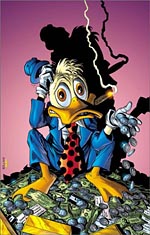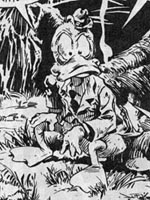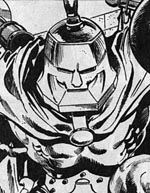
 Writer: Steve Gerber
Writer: Steve Gerber
Artists: Frank Brunner, Gene Colan, Val Mayerik and others
Inkers: Klaus Janson, Steve Leialoha and others
Letterers: John Costanza, Jim Novak and others
Collecting FEAR #19, GIANT SIZE MAN-THING #4-5, HOWARD THE DUCK #1-27, MARVEL TREASURY EDITION #1 and HOWARD THE DUCK ANNUAL #1.
Price: $14.95
Publisher: Marvel Comics
ISBN: 0-7851-0831-9
HOWARD THE DUCK is almost more famous as a symbol of the comic industry's faults than as an actual comic.
After the character proved popular in a few short stories and graduated to his own book, copies of the first issue ran into shipping problems and were hoarded by retailers as "collector's items." A few years later, the book's writer and creator, Steve Gerber, got into a dispute with Marvel over ownership of the character, leading to a lengthy battle between writer and publisher that included, among other things, Gerber creating the character 'Destroyer Duck' to help finance his lawsuit against Marvel. Disney also got involved in the legal battle, taking issue with Howard's design, claiming it was too reminiscent of their character Donald Duck.
Then came the movie.
It suffices to say that, for years, Howard the Duck was a joke in the comics industry. Something of an inauspicious fate for a character who once received thousands of write-in votes when he "ran" for president in 1976.
But now, thankfully (or not) we live in a more cynical age, and now the original, acidic, vicious, screamingly funny run of HOWARD THE DUCK is back in print in an affordable volume from Marvel that collects virtually all of the original Steve Gerber run (with the exception of a short-lived comic strip). It seems that this duck may finally get his due.
Howard the Duck had less than auspicious origins. In the last issue of Gerber's 'Man-Thing' storyline in the comic FEAR, before the Man-Thing moved on to his own title, the character literally wandered into the action of what was becoming an increasingly absurd take on Conan-style high-fantasy stories.
Gerber, afraid he'd gone too far over the top (this coming from a man who during his DEFENDERS run introduced an "elf with a gun" and put a supervillian's brain in the body of a deer), promptly killed off the character when the story continued in the first issue of the regular MAN-THING title.
 However, in his brief appearances, the irritable, chain-smoking duck had already gained a loyal following, which decried the 'death' of the character.
However, in his brief appearances, the irritable, chain-smoking duck had already gained a loyal following, which decried the 'death' of the character.
So, Howard was promptly brought back as a backup feature in the most unfortunately named comic of all time, GIANT-SIZED MAN-THING, where he battled such characters as Garko the Man-Frog and HellCow. The throwaway character soon became a breakout hit, and soon Howard was awarded his own book, which quickly established itself as something unlike anything else on the racks.
The stories contained in ESSENTIAL HOWARD THE DUCK follow a simple formula: Howard, accompanied by his human friend/ambiguous love interest Beverly Switzler, finds himself drawn into some bizarre situation parodying then-current events or Marvel characters. Through a combination of tenacity, cynicism and dumb luck, Howard manages to survive the crisis, only to find himself wandering dirty and destitute into his next ordeal.
These simple premises often proved to be only window dressing for even stranger, often existential tales.
Not every series, for instance, would devote an entire issue to a hallucinatory dream sequence in which the main character believes he's being pursued by a giant armoured talking beaver. Nor would most comics deal with "Dreaded Deadline Doom" by interrupting the main story to provide a dialogue between character and creator a decade before Grant Morrison tried the same thing.
No story in HOWARD THE DUCK was exactly what it seemed at first glance. The second issue's 'Space Turnip' story provided a dead-on parody of Warren science-fiction stories, while the horror-comic parody of issue six's 'The House of Forbidden Cookies' also comments upon artist Gene Colan's own work in books like TOMB OF DRACULA.
Gerber himself inserted his own characters into the story in bizarre roles - his character Omega the Unknown appears as a confused God-figure in the beaver-nightmare story, while the rock group KISS (whose Marvel comic Gerber had scripted), appear as a mental patient's hallucinations brought to life.
 The plot of a HOWARD THE DUCK story was often second to the tale's satirical drive. Read 'The Real, True, Super-Sensational Inside Scoop on the Wanton, Shameless Past of Doctor Bong' in issue 17 and you'll find a dead-on parody of tabloid journalism and Rolling Stone magazine, but relatively little information on how the titular villain came to have a bell for a head.
The plot of a HOWARD THE DUCK story was often second to the tale's satirical drive. Read 'The Real, True, Super-Sensational Inside Scoop on the Wanton, Shameless Past of Doctor Bong' in issue 17 and you'll find a dead-on parody of tabloid journalism and Rolling Stone magazine, but relatively little information on how the titular villain came to have a bell for a head.
Or there's 'May the Farce Be With You!' in issue 22, which seemingly resumes the narrative from Howard's initial MAN-THING appearance, only to transform into a parody of, well, that movie that was out at the time.
Countless cliffhangers were resolved in the opening pages of the next issue before the story would go off in another direction altogether, with Howard haplessly drawn in as he uttered his classic catchphrase: "Waaaaugh!"
A major part of the charm of a Howard story was that for all the satirical bombast, the action of the comic was played relatively straight. Artists like Colan and Frank Brunner, both better known for their fantasy and horror comics, gave Howard's world a dark, realistic look, in contrast to the absurd characters and situations.
Likewise, Howard's misadventures were vested in the time-honoured traditions of Marvel comics - long running plot lines, psychotic supervillians with bizarre powers, and of course, a self-loathing hero. No matter what menace Howard thwarted, he would still be a misanthropic outcast "trapped in a world he never made".
HOWARD THE DUCK is a book that is at once both sillier and more serious than its title suggests, one that finally has a chance to be discovered by a new generation. And, of course, in addition to reprinting Gerber's original run, Marvel has finally worked out the character's legal problems and brought him back in a Marvel Max mature readers miniseries, written by Gerber and drawn by Phil Winsdale.
Except there were some problems shipping out the first issue.
Oh, and due to the problems with Disney, for the bulk of the miniseries, Howard was a rat.
It's back to business as usual for this duck...

This article is Ideological Freeware. The author grants permission for its reproduction and redistribution by private individuals on condition that the author and source of the article are clearly shown, no charge is made, and the whole article is reproduced intact, including this notice.


